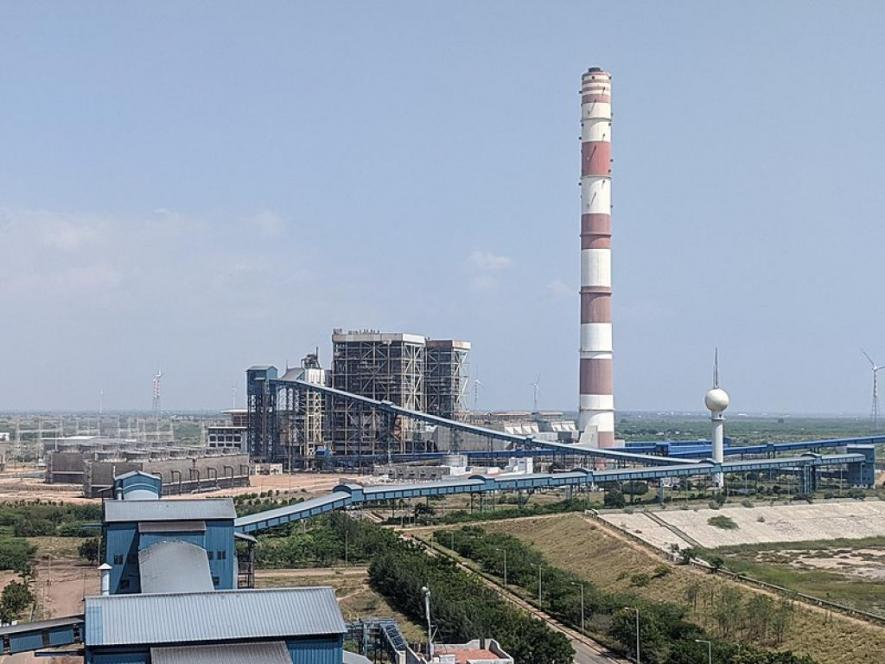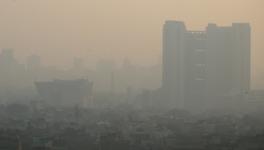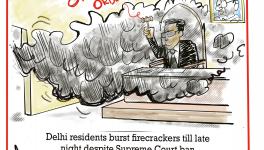Delhi Meets Power Demand Without Operating Non-Compliant Coal-Based Power Plants: CREA Report

Image Courtesy: Down To Earth
New Delhi: Only six units at two power plants out of twelve have installed Sulpher Oxides (SO2) control devices in a 300-kilometre radius of Delhi-NCR even after six years of emission standard notification being notified in December 2015.
On the 6th anniversary of emission standard notification for coal-based power plants on Tuesday, an analysis paper by the Centre for Research on Energy and Clean Air (CREA) in its research paper highlighted that the operation of power plants in Delhi-NCR can be better regulated to meet power demand for the region without operating polluting non-compliant power plants during winter months.
Last month, due to hazardous air quality in Delhi NCR, the Commission for Air Quality Management (CAQM) directed all thermal power plants (TPP) except five (Rajiv Gandhi TPP, NTPC Jhajjar; Rajiv Gandhi TPP, RGTPS, Hisar; Panipat TPS, HPGCL; Rajpura TPP, Nabha Power Ltd., and Talwandi Sabo TPS, Mansa) to be shut down till November 30, 2021. The directions were further extended till December 15, 2021, as the air quality remained in the adverse range.
The analysis by CREA shows that coal-based power plants in the 300-kilometre radius of Delhi-NCR generated negligible or no electricity from November 14 to 23 in 2020, when the electricity demand ranged between 175 MUs-275 MUs and the shortage remained in the range of 0-5 MUs (0.65% of highest demand day, November 20, 2020) indicating that the region could meet any such or lower demands without operating coal-based power plants in the 300-kilometre radius.
“The directions issued by CAQM fall short because all other power plants were anyway not operated since November 12, 2021, due to low demand or other reasons, so the action could not effectively result in any emission load reductions. Four units at Dadri Power Plant, which have Flue Gas Desulphurisation controls installed, were also directed to close by CAQM. In contrast, others without SO2 controls were allowed to operate, meaning relatively higher emissions and pollution. Instead, the four units at Dadri that have installed SO2 controls could have been allowed at the place of others who do not have FGD installed,” said the analysis.
In December 2015, acknowledging the contribution of coal-based power plants to air pollution, MoEF&CC came out with a stricter emission standard notification for coal-based power plants and required them to retrofit with efficient pollution control technologies to reduce SO2, NO2, PM, and Mercury emissions in two years. At the same time, the notification also set a limit for water consumption for the power plants.
The power plant operators did not follow the initial deadline of two years (by December 7, 2017), and it was extended to December 31, 2019. All units except two units at Mahatma Gandhi TPP violated the emission limits from January 2020 to March 2021 when another extension was granted. As a result of the latest extension, the power plants in Delhi-NCR now have a time limit for the installation of SO2 controls pushed to December 2022, five years after the lapse of the first timeline and seven years since the announcement of the notification.
Sunil Dahiya, an analyst at CREA said that “Power plants with SO2 controls should be operated at maximum capacity to reduce the need for power plants without FGD control.” He further added that “Power plants which haven’t awarded the bids for FGD installation till now should be penalised as one year left to comply even under new extended timeline isn’t enough for them to complete the process which will again leave them in non-compliance.”
He further stressed that the air quality forecasting system should be better utilised by CAQM and Central Pollution Control Board to take science-based decisions towards reducing emission load, and arrangements for power supply should be made so that the non-compliant power plants can be shut down during the winter months.
Get the latest reports & analysis with people's perspective on Protests, movements & deep analytical videos, discussions of the current affairs in your Telegram app. Subscribe to NewsClick's Telegram channel & get Real-Time updates on stories, as they get published on our website.
























